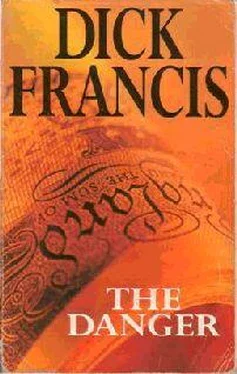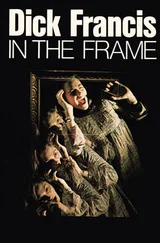At times Traventi had been required to pick up packages at a certain spot, usually but not always the same place, and it was to that place that we were now headed. It had become not just the post-box for proof of Alessia's still being alive, or for appeals from her, or demands from HIM, or finally, earlier that evening, for the instructions about where to take the ransom, but also the place where Giorgio Traventi met Paolo Cenci, so that they could consult together in private. Neither had been too happy about the carabinieri overhearing their every word on the telephone and I had to admit that their instincts had been right.
It was ironic that at the beginning Giorgio Traventi had been approached by Cenci and his own lawyer simply because Traventi did not know the Cenci family well, and could act calmly on their behalf. Since then the whole Traventi family had become determined on Alessia's release, until finally nothing could have dissuaded Lorenzo from carrying the ransom himself. I hadn't approved of their growing emotional involvement - exactly what I had been warned against myself - but had been unable to stop it, as all of the Traventis had proved strong-willed and resolute, staunch allies when Cenci needed them most.
Indeed, until the carabinieri's ambush, the progress of negotiations had been, as far as was possible in any kidnap, smooth. The demand for six million had been cooled to about a tenth of that, and Alessia, on that afternoon at least, had been alive, unmolested and sane, reading aloud from that day's newspaper onto tape, and saying she was well.
The only comfort now, I thought, driving Cenci in his Mercedes to meet Ricardo, was that the kidnappers were still talking. Any message at all was better than an immediate dead body in a ditch.
The meeting place had been carefully chosen - by HIM - so that even if the carabinieri had had enough plain-clothes men to watch there day and night for weeks on end, they could have missed the actual delivery of the message: and indeed it was pretty clear that this had happened at least once. To confuse things during the period of closest continual watch, the messages had been delivered somewhere else.
We were heading for a motorway restaurant several miles outside Bologna, where even at night people came and went anonymously, travellers unremembered, different every hour of every day. Carabinieri who sat for too long over a coffee could be easily picked out.
Messages from HIM were left in a pocket in a cheap, grey, thin plastic waterproof, to be found hanging from a coat-rack inside the restaurant. The row of pegs was passed by everyone who went in or out of the cafeteria-style dining-room, and we guessed that the nondescript garment was in its place each time before the collect-the-message telephone call was made.
Traventi had taken the whole raincoat each time, but they had never been useful as clues. They were of a make sold throughout the region in flat, pocket-sized envelopes as a handy insurance against sudden rainstorms. The carabinieri had been given the four raincoats so far collected from the restaurant, and the one from the airport and the one from the bus station. All had been new, straight out of the packet, wrinkled from being folded, and smelling of the chemicals they were made from.
The messages had all been on tape. Regular-issue cassettes, sold everywhere. No fingerprints on anything. Everything exceedingly careful; everything, I had come to think, professional.
Each tape had contained proof of Alessia's being alive. Each tape contained threats. Each tape carried a response to Traventi's latest offer. I had advised him to offer only two hundred thousand at first, a figure received by HIM with fury, faked or real. Slowly, with hard bargaining, the gap between demand and credibility had been closed, until the ransom was big enough to be worth HIS trouble, and manageable enough not to cripple Cenci entirely. At the point where each felt comfortable if not content, the amount had been agreed.
The money had been collected: Italian currency in used everyday notes, fastened in bundles with rubber bands and packed in a suitcase. Upon its safe delivery, Alessia Cenci would be released.
Safe delivery… ye gods.
The motorway restaurant lay about equidistant from Bologna and the Villa Francese, which stood in turreted idyllic splendour on a small country hillside, facing south. By day the road was busy with traffic, but at four in the morning only a few solitary pairs of headlights flooded briefly into our car. Cenci sat silent beside me, his eyes on the road and his mind heaven knew where.
Ricardo on his scooter arrived before us in the car park, though if anything he had had further to travel. Like his brother he was assertively intelligent, his eyes full now of the aggression brought on by the shooting, the narrow jaw jutting, the lips tight, the will to fight shouting from every muscle. He came across to the car as we arrived and climbed into the back seat.
'The bastards,' he said intensely. 'Lorenzo's state is critical, Papa says.' He spoke Italian, but distinctly, like all his family, so that I could nearly always understand them.
Paolo Cenci made a distressed gesture with his hands, sparing a thought for someone else's child. 'What is the message?' he said.
'To stand here by the telephones. He said I was to bring you, to speak to him yourself. No negotiator, he said. He sounded angry, very angry.'
'Was it the same man?' I asked.
I think so. I've heard his voice on the tapes, but I've never spoken to him before. Always Papa speaks to him. Before tonight he wouldn't speak to anyone but Papa, but I told him Papa was at the hospital with Lorenzo and would be there until morning. Too late, he said. I must take the message myself. He said that you, Signor Cenci, must be alone. If there were any more carabinieri, he said, you wouldn't see Alessia again. They wouldn't return even her body.'
Cenci trembled beside me. 'I'll stay in the car,' I said. 'In my cap. They'll accept that. Don't be afraid.'
'I'll go with you,' Ricardo said.
'No.' I shook my head. 'Ricardo too might be taken for carabinieri. Better stay here with me.' I turned to Cenci. 'We'll wait. Have you any gettoni if he asks you to call him back?'
He fished vaguely through his pockets, and Ricardo and I gave him some of the necessary tokens; then he fumbled with the door handle and stood up, as if disoriented, in the car park.
'The telephones are near the restaurant,' Ricardo said. 'In the hall just outside. I have telephoned from there often.'
Cenci nodded, took a grip on the horrors, and walked with fair steadiness.to the entrance.
'Do you think there will be someone watching?' Ricardo said.
'I don't know. We cannot take the risk.' I used the Italian word for danger, not risk, but he nodded comprehension. It was the third time I'd worked in Italy: time I spoke the language better than I did.
We waited a long time, not speaking much. We waited so long that I began to fear either that no call would come to Cenci at all, that the message had been a retributive piece of cruelty, or even worse, that it had been a ruse to lure him away from his house while something dreadful took place in it. My heart thumped uncomfortably. Alessia's elder sister, Ilaria, and Paolo Cenci's sister, Luisa, were both upstairs in the villa, asleep.
Perhaps I should have stayed there… but Cenci had been in no state to drive. Perhaps I should have awoken his gardener in the village, who drove sometimes on the chauffeur's days off… Perhaps, perhaps.
The sky was already lightening to dawn when he returned, the shakiness showing in his walk, his face rigid as he reached the car. I stretched over and opened the door for him from the inside, and he subsided heavily into the passenger seat.
Читать дальше












